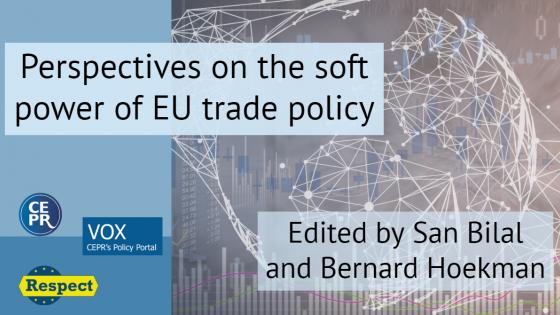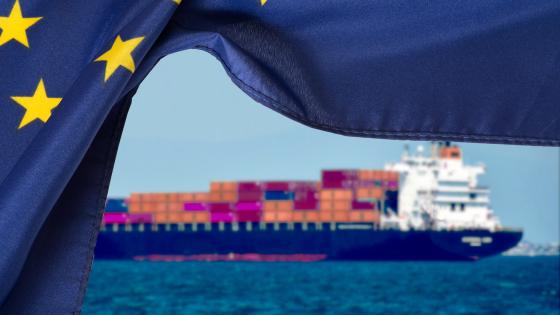The international trade scene is in turmoil: the emergence of trade conflicts among major economies stirred by the United States (Evenett and Fritz 2018, Bown and Zhang 2018), with resulting uncertainty for businesses, weakening of multilateralism and the inability so far of the global trading system to adapt to the rise of emerging economies. Increasing inequalities within countries and the rise of populism and nationalism have further contributed to put the international trade order into question. Societies confront major challenges in adjusting to rapid technological changes and the growth of the digital economy, responding to global problems such as climate change and addressing universal values on human rights (including labour, social and gender issues) and attaining a universally shared 2030 Agenda on sustainable development.
In this rapidly evolving and uncertain context, the EU has to reposition itself, adapting its trade and external policies to better pursue its economic interests, but also to achieve its political, geostrategic, developmental, environmental, and principles-based objectives. Better harnessing its soft power to achieve its various external policy goals is a prerequisite, which in turn implies enhancing the coherence of the disparate policy instruments that are available to the EU and to its member states.
Download the new eBook, Perspectives on the Soft Power of EU Trade Policy, here
Trade policy is a major instrument of EU soft power. It is increasingly used as an instrument to pursue the Union’s non-trade external policy goals, including the values established in the Lisbon Treaty. Thus, preferential access to the EU market – whether through non-reciprocal trade preferences for developing countries or through reciprocal trade agreements – may be conditioned on respect for human rights and fundamental freedoms (Borchert et al. 2018). EU trade agreements aim not only at reducing market access barriers but also at improving regulation in partner countries, including social, labour and environmental policy. These now figure in trade and sustainable development chapters in EU trade agreements. Ensuring that trade benefits all, including developing countries and poorer people, is a central dimension of the EU ‘Trade for All’ strategy. This strategy recognises that trade policy by itself is insufficient. Other policies, notably development assistance (‘aid for trade’), are needed to complement trade policy.
Having put in place a comprehensive strategy, the challenge for the EU is to implement it in a coherent manner. Given the multi-purpose nature of its trade policy, this is not straightforward. Matters have become more complicated following the decision by the Trump administration to revert to ‘aggressive unilateralism’ and pursue a more protectionist trade policy (Vangrasstek 2018). The resort to protectionist measures by the US and the tit-for-tat responses by targeted countries, including the EU, undercut the open, rules-based multilateral trading system. Designing appropriate responses to intensifying international trade conflicts and tensions is one of the key tasks confronting the new Commission.
Sustaining the rules-based multilateral trading system is an important element of the challenge confronting the EU. The WTO is supposed to be the global forum where countries agree on rules of the game for trade policies and resolve trade disputes. The WTO has failed to perform this function. One reason for this is the rise of emerging economies, first and foremost China; another is that the WTO was not designed for a world of global value chains and the digital economy. The first round of multilateral trade negotiations launched under WTO auspices – the 2001 Doha Development Agenda – provided an opportunity to update the rules, but ended in failure after coming close to a deal in 2008. The subsequent decade-long deadlock – in part reflecting the consensus-based working practices of the WTO – impeded the dialogue and cooperation needed to resolve rising trade tensions (Hoekman 2019). The opportunity cost of WTO deadlock has been substantial. Research suggests that foreign trade-distorting measures implemented since 2009 have reduced EU export growth by 10-20 percentage points (Evenett and Fritz 2017). Many of the instruments involved are only partially subject to WTO rules, and lie at the heart of the purported motivation for the unilateral recourse to protectionist trade measures by the US against China.
In addressing these challenges, the EU faces internal constraints reflected in differences in trade policy preferences across the member states and opposition to the negotiation of deep trade agreements by some civic interest groups. The underlying concerns vary across groups but often centre on the protection of regulatory standards and social values. Addressing these concerns is critical both because of the importance of trade for the EU economy and because of the role trade can play in raising real incomes and stimulating sustainable development in EU partner countries.
As a long-standing proponent of multilateralism, the EU has an important role to play in providing leadership to strengthen existing and building new alliances to defend the rules-based trading system. This entails active support for WTO reform, including addressing the stalemate that has emerged in dispute settlement, and tackling up front a range of issues that give rise to negative spillover effects, including industrial subsidies, the behaviour of state-owned enterprises, climate change-related policies (in line with the Paris Agreement), digitalisation, and artificial intelligence.
The EU is actively negotiating with the US, including in talks on a bilateral agreement on industrial goods tariffs, re-visiting possibilities for sector-specific regulatory cooperation1 and a trilateral effort with Japan and the US focusing on common concerns regarding China’s trade-related policies. The EU is also engaging with the US over WTO reform.2 In parallel, it has ramped up efforts to conclude trade agreements with major economies and developing countries as a means of improving the governance of trade relations and expanding cooperation to policy areas that affect the ability of firms to compete fairly for markets.
How well has the EU been able to implement its ambitious multi-purpose trade agenda? Has the EU been effective in pursuit of non-trade policy objectives relating to standards, values, sustainability and development? If so, has it been at the expense of more traditional trade policy objectives (market opening)? How well does the EU use its soft power in the trade policy arena? What are the lessons from recent experiences, and are adjustments needed? These questions are the focus of an ongoing research project supported by the EU Horizon 2020 programme – Realising Europe’s Soft Power in External Cooperation and Trade (RESPECT). One element of this project was an anonymous survey questionnaire implemented in 2018-19 soliciting views from trade practitioners in the EU and in partner countries on the design and implementation of EU trade and external policies, including development cooperation programmes. Another element of the project was to use the survey to solicit interest by respondents to submit essays expounding their views on different dimensions of EU external policy.
A new eBook brings together a summary of some of the survey findings and 20 contributions that provide more in-depth perspectives on some of these questions posed above (Bilal and Hoekman 2019). The diversity of approaches and views illustrate the complexity of the EU trade-related policy agenda. Some broad trends tend to emerge, however. The EU has adopted a principle-based, yet pragmatic approach to its trade policy. It continues to see multilateralism as the core of its external policy and remains a lead advocate of the WTO system. Yet, in face of the stalemate of the Doha round, the EU has also increasingly been pursing preferential trade agreements as a means to forge stronger economic and political relations at a bilateral level. In doing so, it may have contributed to weakening the multilateral rules-based system it supports, by pushing its own rules, standards and principles. Increasingly, EU trade policy is being harnessed to its strategic and business interests, one reflection of which is the effort to foster its own economic diplomacy. While the framework for EU trade policy is comprehensive, the trade-offs it implies might not always be properly assessed, and the balance struck might be sub-optimal.
Overall, the message of the contributions to the eBook is that the EU should be more ambitious, more assertively using its soft power, in particular to open up its partners’ markets (including in key services sectors) and defending core principles, while promoting economic development outcomes based on its partners priorities rather than its own. The soft power of the EU should be pursued through constructive engagement and dialogue with its partners, linking its trade policy to broader strategic partnerships (such as the new Alliance with Africa and the EU partnership with ASEAN) and more systematically to the sustainable development goals and Paris Agreement. Adopting a differentiated approach based on its partners capacities (as in the case of the WTO Trade Facilitation Agreement), better supporting geographical indications of value for developing countries, fostering linkages between trade policy and innovation and science-based policies, supporting fair and ethical trade, and more forcefully enforcing labour rights are among the other suggestions that are made.
Authors’ note: This column introduces an eBook that has been supported by funding from the European Union’s Horizon 2020 research and innovation programme under grant agreement No 770680 (RESPECT: Revitalizing Europe’s Soft Power and External Cooperation and Trade).
References
Bilal, S and B Hoekman (eds) (2019), Perspectives on the soft power of EU trade policy, CEPR Press.
Borchert, I, P Conconi, M Di Ubaldo and C Herghelegiu (2019), “Trade Conditionality in the EU and WTO legal regimes”, RESPECT working paper.
Bown, C and Y Zhang (2019), “Measuring Trump's 2018 Trade Protection: Five Takeaways”, Petersen Institute.
Evenett, S and J Fritz (2017), Europe Fettered: The impact of crisis-era trade distortions on exports from the European Union, A Global Trade Alert Report, CEPR Press.
Evenett, S and J Fritz (2018), Brazen Unilateralism: The US-China Tariff War in Perspective, The 23rd Global Trade Alert Report, CEPR Press.
Hoekman, B (2019), “Urgent and Important: Improving WTO Performance by Revisiting Working Practices”, Journal of World Trade 53(3): 373-94.
Vangrasstek, C (2019), “The trade policy of the United States under the Trump administration”, EUI Working Paper RSCAS 2019/11.
Endnotes
[1] “EU-U.S. Trade Talks: European Commission presents draft negotiating mandates”, European Commission Press release, 18 January 2019.
[2] The EU and the US have agreed to work together with Japan and other countries to discuss WTO reform. The European Commissioner met with the USTR and the Japanese trade minister to discuss this matter in January 2019. See “Joint EU-U.S. Statement following President Juncker’s visit to the White House”, 25 June 2018; “U.S. Rejects the EU's Trade Reform Proposal, Putting WTO at Risk”, Bloomberg, 12 December 2018; “Joint Statement of the Trilateral Meeting of the Trade Ministers of the European Union, Japan and the United States”, 9 January 2019.


